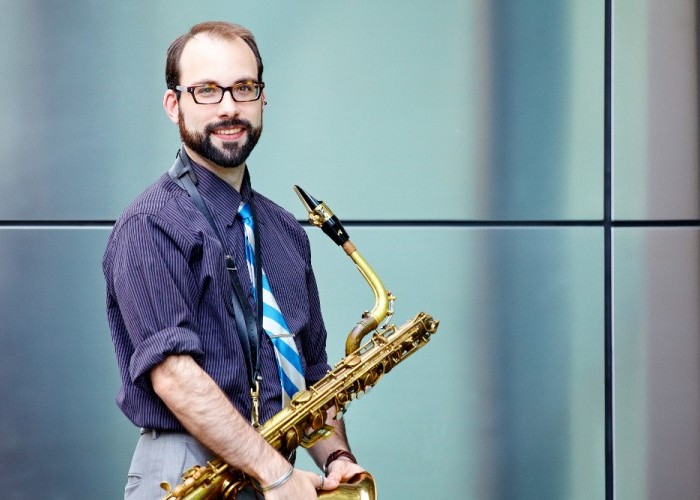Jan 13, 2026 2:09 PM
More Trump-Kennedy Center Cancellations
The fallout from the renaming of the John F. Kennedy Center for the Performing Arts to include President Donald…

Andrew Hadro is a co-founder of Tone Rogue Records.
(Photo: James Korn)Baritone saxophonist-composer Andrew Hadro has always bucked the status quo. “I just want to be different,” explained the longtime Brooklyn resident, “and that’s just part of my playing and my whole musical approach.” Rather than follow the path of bop-oriented bari blazers like Ronnie Cuber or Denis DiBlasio, Hadro prefers to play the baritone saxophone in a soft, beautiful, subtle way. And rather than waiting around to be signed to a label, he’d rather do it himself.
“It seems to me that everybody just puts out an album, they go through the motions, spend the money and they just sort of throw it out there into the sea of CDs and hope that something comes back,” said the fiercely independent musician, who has joined forces with pianist-composer Julian Shore to form the aptly named Tone Rogue Records. “I’m not interested in just blanket marketing, having anonymous people maybe check it out in passing. I’m more interested in finding the people who are interested in what I’m doing and connecting more seriously with those people. I’d rather have a few hundred people who really check it out and find it special, put it in their listening playlists and are familiar with it, will come see my gigs, email me and be in touch, as opposed to having 10,000 listeners that maybe heard my music in passing but don’t remember it.”
Fortunately for Hadro, a couple of past jobs—he worked as senior project manager at ArtistShare Records for four years and also was a web designer for fellow musicians—has given him a leg up on other musicians looking to forge their own independent path in the music industry. “What I’ve learned in the last few years really helped me to have the confidence and the knowledge to do all this stuff myself,” he said.
In Tone Rogue, Hadro and Shore have established a platform for fellow jazz musicians who don’t want to go the major-label route. “Maybe they just don’t want to deal with the business stuff on that level or they want to have more control of their music. So, we developed our label, we can generate catalog numbers and everybody can do their own thing. The artists are 100 percent in control of their albums, from album artwork to the music. And it’s actually expanded more than we ever expected.”
Along with Hadro’s two releases (2014’s For Us, The Living and 2018’s For Us, The Living II: Marcescence) and Shore’s two (2016’s Which Way Now? and 2012’s Filaments), Tone Rogue also has released recordings by pianist Carmen Staaf (2017’s Day Dream), guitarist Ricardo Grilli (2017’s 1954) and saxophonist Andrew Van Tassel (2016’s It’s Where You Are).
“These are all people we know and hang out with in Brooklyn, musicians of a similar mindset,” said Hadro, who holds down a day job at Vandoren, where he interacts with saxophonists and clarinetists in both the classical and jazz worlds. “Instead of just going through all the trouble of starting their own DIY label, they came to us and said, ‘Hey, Julian and Andrew, you have experience with this, can you help us out?’ There’s so much to do when you’re an independent artist. If you can get a little help from somebody who has something already done—who has a label or at least a name who has a website already—it just takes a few things off the to-do list.
“Most of the musicians in Brooklyn are all do-it-yourselfers,” Hadro continued, “so, we’re all figuring it out and sharing the knowledge when we can. So, I wouldn’t mind passing on my knowledge of the business that I have definitely learned the hard way.”
Regarding his renegade approach to bari playing—evident throughout his highly produced Marcescence, which was three years in the making and incorporates overdubbed choirs of saxophones and flutes on several tracks—Hadro said: “I’m not necessarily against the blowtorch approach to baritone saxophone. I grew up with Ronnie Cuber. He’s one of my heroes; I’m in awe of his playing. But I’m never going to out-Ronnie Cuber Ronnie Cuber. It’s not that I think that baritone saxophone can’t be a blazing instrument and honk and play low and make loud noises; I just think it should be balanced. There should be an equal amount of delicate, highly arranged or maybe more subtle stuff. There should be more options, more variety.” DB

Belá Fleck during an interview with Fredrika Whitfield on CNN.
Jan 13, 2026 2:09 PM
The fallout from the renaming of the John F. Kennedy Center for the Performing Arts to include President Donald…

Peplowski first came to prominence in legacy swing bands, including the final iteration of the Benny Goodman Orchestra, before beginning a solo career in the late 1980s.
Feb 3, 2026 12:10 AM
Ken Peplowski, a clarinetist and tenor saxophonist who straddled the worlds of traditional and modern jazz, died Feb. 2…

The success of Oregon’s first album, 1971’s Music Of Another Present Era, allowed Towner to establish a solo career.
Jan 19, 2026 5:02 PM
Ralph Towner, a guitarist and composer who blended multiple genres, including jazz — and throughout them all remained…

Rico’s Anti-Microbial Instrument Swab
Jan 19, 2026 2:48 PM
With this year’s NAMM Show right around the corner, we can look forward to plenty of new and innovative instruments…

Richie Beirach was particularly renowned for his approach to chromatic harmony, which he used to improvise reharmonizations of originals and standards.
Jan 27, 2026 11:19 AM
Richie Beirach, a pianist and composer who channeled a knowledge of modern classical music into his jazz practice,…